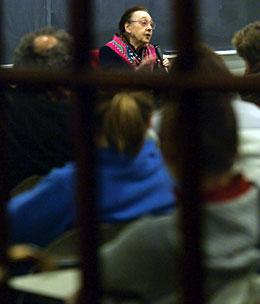Â鶹Porn students packed into Lathrop Hall Monday night 30 minutes before the guest speaker was to begin.
When Helen Sperling entered the room she implored the standing students to try and find empty seats, asking them not to make her feel guilty because she had a lot to say.
Sperling is a Polish Jew and a Holocaust survivor. She has been speaking publicly about the Holocaust for 44 years, long before the public took an active interest in it.
The 88-year old has spoken at Â鶹Porn numerous times, and each time her story touches students in a new way.
Peter Balakian, Donald M. and Constance H. Rebar Professor in Humanities, credits her with being an important voice in Â鶹Porn’s moral education.
In her talk, Sperling described her childhood, her time in a Polish ghetto, and inevitably her time in the concentration camps. Sperling was first imprisioned at RavensbrĂĽck and then later she was transported to Buchenwald. Through her hardships, Sperling found ways to hold on to her sense of self.
 |
| Helen Sperling is seen talking with students during a prior visit to Â鶹Porn. (File photo) |
At Buchenwald she worked in an ammunition factory, and Sperling said she sabotaged shells by cutting them too short or too long.
One day an overseer noticed that Sperling wasn’t correctly cutting the shells but assumed she was just being lazy. Sperling was beaten severely for her “laziness.”
During her next shift the same overseer brought her an apple to eat, as if he was giving a bone to his dog, but Sperling refused. The next day he offered her a slice of bread, again Sperling refused. The next day he brought her a piece of cake, again Sperling refused.
Sperling cites this moment of defiance as one of the bright points in her time at the camp.
“He knew I knew I wasn’t a slave. I owe him a lot. He owes me a kidney, but I owe him a lot.”
Six million Jews died in the Holocaust. Sperling lost her entire family, save one brother she was reunited with when the war ended. Sperling acknowledged that sometimes the numbers are too abstract to comprehend.
“This is my mother and my father,” Sperling said as she held up photographs that her nanny had saved when she emigrated to America. “Look at them. They are not a number. They are mine, and I miss them.”
Sperling ended her talk with her favorite Jewish legend. In every generation there are 36 righteous people, because of these people the world will be saved No one knows who the 36 righteous people are, which means they could be anyone.
Sperling asked the students to be accept the possibility that they could be one of these righteous people. Sperling told the students that through how they feel and act they could save the world.
“Go do it.” Sperling said. “The world needs saving.”